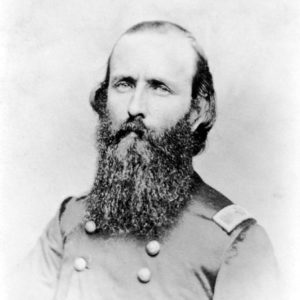calsfoundation@cals.org
Marcus LaRue Harrison (1830–1890)
Marcus LaRue Harrison organized the First Arkansas Cavalry Regiment (Union) and served as its colonel during the Civil War. After the war, he had a hand in a number of Reconstruction projects, including the reestablishment of Arkansas’s postal service, politics, and railroad promotion. The city of Harrison (Boone County) was named for him.
M. LaRue Harrison was born on April 1, 1830, in Groton, New York, the son of Marcus Harrison, a Presbyterian minister and anti-slavery activist, and Lydia House. Because his father had to move often, Harrison’s childhood was spent in various locations in New York, Michigan, and Illinois. By 1850, he had settled in Nashville, Illinois, and married Rebecca Axley, the first of his three wives. The couple had two sons.
Harrison’s first wife died in 1861. Soon thereafter, Harrison married Medora Bigby of Springfield, Missouri, whom he divorced in 1873, gaining custody of their daughter. Later in 1873, Harrison married Mollie Merrill, a Baltimore widow, with whom he had one son.
During the 1850s, Harrison became involved in the rapidly expanding railroad business, working first for the Chicago, Burlington, and Quincy Railroad, and then the Burlington and Missouri River Railroad. By the beginning of the Civil War, he served the latter as master of buildings and car repairs.
In September 1861, Harrison enlisted in the Thirty-sixth Illinois Volunteer Regiment as a private. He accompanied that unit to southern Missouri and was made an acting lieutenant of engineers to build defenses around Springfield. During the summer of 1862, he received permission to organize Arkansas Unionist refugees in southern Missouri into the First Arkansas Cavalry Regiment, which was mustered in on August 7, 1862. During the war, the First Arkansas Regiment saw action at the Battle of Prairie Grove and the Action at Fayetteville and at other battle sites in northwestern Arkansas. As colonel, Harrison commanded the unit throughout its existence. Fayetteville eventually became the headquarters of the unit, which was charged with responsibility for the occupation of Benton, Carroll, Madison, Marion, Newton, Searcy, and Washington counties. Pacification of this badly divided region involved countering the activities of guerrilla bands, an endeavor to which Harrison was willing to apply innovative and controversial techniques.
By late 1864, Harrison initiated the controversial post colonies, sometimes called farm colonies. Much of northwestern Arkansas was without civil law, and guerrilla activity was rampant. Harrison’s avowed goal was to relocate residents willing to submit to Union authority to fortified colonies occupying 1,000 to 4,000 cultivable acres with abundant water. Families of men willing to swear loyalty to the Union would receive parcels of farmland surrounding the forts. Harrison claimed that membership in the colonies was voluntary, but his superior, Cyrus Bussey, reported that “numerous delegations of old men of loyalty and good character” claimed that Harrison forced peaceful residents to join. At the system’s peak, seventeen colonies were inhabited by 1,200 colonists, who controlled 15,000 acres. Most colonies were located in Washington and Benton counties, including Union Valley in the former and Pea Ridge (Washington County) and Bentonville (Benton County) in the latter.
Bussey, perhaps influenced by the citizen complaints, was suspicious of Harrison’s motives, thinking that he sought financial gain through distribution of rations to the colonies or that he was building a political basis in preparation for a congressional race at war’s end. Bussey conducted an investigation and effectively ordered the end of the experiment Harrison had hoped to expand. The issue became moot later in the spring when the war ended, although some of the residents remained in their colonies until harvest because crops had already been planted.
At war’s end, the First Arkansas was mustered out, and its leader was rewarded for his service with the brevet rank of brigadier general. Harrison then turned his attention to railroads and politics. In 1868, Harrison announced his candidacy for Congress but did not actively campaign for the office. In early 1869, he became mayor of Fayetteville (Washington County). His tenure was short, however, because his opponents soon persuaded the legislature to vacate the city’s charter as a way to remove Harrison. When a new government was created under the state’s general incorporation statute, Harrison’s successor as mayor was Erasmus Stirman, who had served as colonel of the Confederate First Arkansas Cavalry Regiment.
Harrison played a key role in the promotion of the Pacific and Great Eastern Railroad, a line projected to run from the Missouri bootheel to the western boundary of Arkansas, near Cincinnati (Washington County). Harrison took the title of chief engineer for the company and acted as its lobbyist in the state legislature and the U.S. Congress. He also lobbied for the larger United States and Mexico Railway, with which the Pacific and Great Eastern Railroad was to be linked.
As he led a surveying party for his company across the Crooked Creek area of north-central Arkansas, Harrison was approached by a group of real estate promoters to plan a town for them. In return, the promoters named the town Harrison, and a nearby post office was likewise re-designated. After the new town was incorporated, it became the seat of a new county, Boone, created primarily from parts of Carroll County.
Failing to secure federal or state aid for his railroad scheme, Harrison accepted an appointment with the U.S. Post Office Department. After some time as a special agent in Arkansas, he moved to Washington DC, where he served as chief inspector of the money order bureau. He held this post at the time of his death on October 27, 1890, of chronic bronchitis, a condition he claimed to have developed during the war. He is buried in Arlington National Cemetery.
For additional information:
Beall, Wendall. “Wildwood Skirmishers: The First Federal Arkansas Cavalry.” MA thesis, University of Arkansas at Fayetteville, 1988.
History of Benton, Washington, Carroll, Madison, Crawford, Franklin, and Sebastian Counties, Arkansas. Chicago: Goodspeed Publishing Company, 1889.
Hughes, Michael A. “Wartime Gristmill Destruction in Northwest Arkansas and Military-Farm Colonies.” Arkansas Historical Quarterly 24 (Spring 1965): 146–47.
Logan, Roger V., Jr. “General M. LaRue Harrison.” Boone County Historian 2 (Summer 1979): 2–3.
Williams, Nancy A., ed. Arkansas Biography: A Collection of Notable Lives. Fayetteville: University of Arkansas Press, 2000.
Richard A. Bland
Rogers High School and Northwest Arkansas Community College
This entry, originally published in Arkansas Biography: A Collection of Notable Lives, appears in the CALS Encyclopedia of Arkansas in an altered form. Arkansas Biography is available from the University of Arkansas Press.







Comments
No comments on this entry yet.